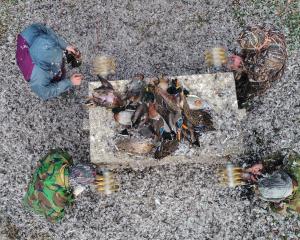
There are concerns thousands of hunters will not have their licences approved in time for the looming duck-shooting season and the Roar, as police grapple with new licensing systems and increasing demand.
There are close to 10,000 applications still in the pipeline.
One Invercargill hunter, who did not want to be named, said he first applied for a licence 13 months ago.
He was initially told it would take a maximum of six months to be processed, and had hoped to have it in time for last year’s duck-shooting season.
Now he was unlikely to have it for this year’s season.
All of the interviews and inspections had been carried out before Christmas, and now he was just waiting for a sign-off.
He had a frank assessment of the situation: "it’s b......t".
"If we get a speeding ticket from them they expect it paid within 28 days.
"So if I’m going to give them a large sum of money, I expect something similar back, not 13 months."
Changes last year to the Arms Act and the way it is implemented have had an impact on processing times.
Officer in charge of arms safety and control Superintendent Mike McIlraith said police were taking steps to ensure that only people who were fit and proper were able to access, possess and use firearms.
"This has meant new systems and forms, new training for our staff, and more quality assurance processes.
"This, coupled with the impacts of Covid, and a general increase in demand has led to delays in our licensing processing."
More staff had been brought on board to help with applications and they had been prioritising applications based on people who needed their licence for work, and renewals, first.
With duck-shooting season starting in about a month’s time, police were trying to clear as many renewal applications as possible before then, he said.
"We regret that some people may be in a position of not having a current licence when the season starts but they will still be able to take part in duck-shooting, if accompanied by and under the immediate supervision of a current licence-holder."
About 9700 applications were in the pipeline, about 3500 of which were renewals.
Police encouraged existing licence-holders to apply four months before their licence expired.
Otago Fish & Game Council chief executive Ian Hadland said between 200 and 400 duck-shooters nationally would not be able to lawfully shoot on opening weekend.
Some of those might not know that they were unable to buy ammunition for gamebird shooting or use firearms on opening day without immediate supervision, he said.
The national organisation had recently written to the Police Minister to say that the most practical way to deal with the bottleneck in renewals would be to offer an extension or grace period, in a similar way to how vehicle warrants were handled during the Covid Alert Level 4 lockdown, Mr Hadland said.
"That would seem a sensible way forward and still allow duck hunters impacted by this to still participate in the biggest recreational game harvest event in the country — opening weekend of the duck-hunting season."
The New Zealand Deerstalkers Association also said many hunters would miss out on this year’s roar due to the backlog.
Chief executive Gwyn Thurlow said the timing was particularly unfair on hunters who relied on securing meat for their families at this time of year.
Comments
That's a shame because ducks and gulls are responsible for 80% of the E.coli bacterial loading in rivers - not that fish and game will tell the public that.
If you do some research you will actually find that the report you are referring to states that of the Southland waterways they tested 80% contained bird faeces, which is not surprising as many birds live on or near waterways. You would also find that 50% contained faeces from livestock, which is surprising because cattle should be excluded from our waterways. Furthermore, the report goes on to state that there is little associated risks from bird contamination but the potential risks of harmful diseases and ecosystem failure is greatly amplified by the presence of animal pollution.
From the reports @Pat "Wildfowl were determined to be the most
common source of Campylobacter". You know, that bacteria which makes people really crook. Lets get rid of these polluting ducks and geese permanently and clean up our rivers with the same vitriol as farmers are facing daily from the likes of F&G. Quite duplicitous really!















